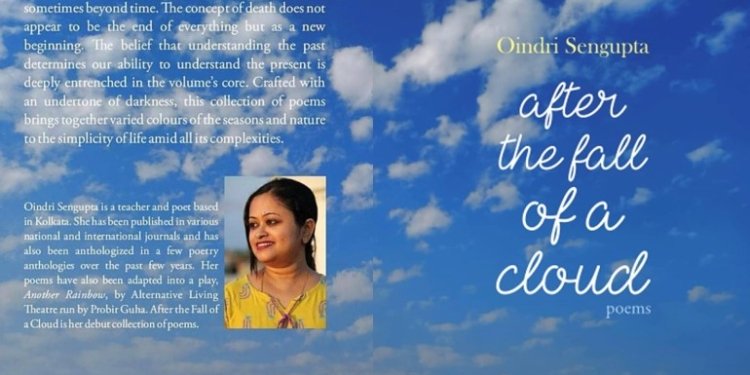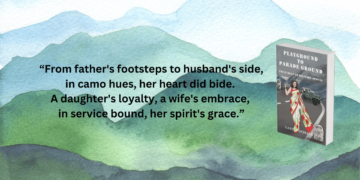Poem: After the Fall of a Cloud
Author: Oindri Sengupta
Reviewer: Anita Nahal
Publisher: Hawakal Publishers
Year: 2022
Pages: 76
ISBN No: 9391431461
Price: INR 300/-
By on Amazon: https://amzn.to/3dyEwtI
The title of this collection of heart-touching poems sets the tone for something tender and poignant, and the reader is not disappointed. Oindri Sengupta’s poems have that wispy quality that leads one gently into imagination and ruminations. Her poems have the exceptional adeptness to connect nature’s countless bounties (and losses) with the abundant gifts in our heart and soul…bounties that humans might gloss over, ignore, or simply not attach any empathetic significance, which in turn can lead to loss, grief, and possibly death. Death, in turn, can point toward resurgence, which is clearly at the centre of this book’s message. Since almost all the poems in this short and enchanting collection are in some way associated with nature, I would call Oindri an environmental-meliorist poet…one who sees the intrinsic value of our ecosystem, one who seeks energy from natural elements, one who attempts a renaissance of human life through a merger of nature with nurture. The cycle of life and death remains in perpetual continuity, and the only way to break free from the yearning for salvation the poet seems to suggest is a cathartic self-evaluation as well as that of others and nature.
One finds in this engrossing, delightful collection sixty-four poems resplendent with similes and delicate weavings of semantics with thoughts and actions. Here are a few examples.
“I ride through the age of salt and pebbles/through the solitary eyes of the same” (Rose is the name)
“I heard that the sun too changes its colours/All you need is to give your skin/and see how many of them look like yours.” (Seven steps to the sun)
“Sometimes all I want to do is just breathe/after sleeping with a spoonful of stars…Sometimes all I want to do is just breathe/the entire sea inside my lungs.” (How not to be)
“I tilled the land with my hands/to see if the scent of soil can speak.” (Light that falls)
“I see a lighthouse gliding into the desert/and invoking the sea with its fingers.” (Into the hollow)
“I knew her till I remembered to remove/stains from the mirror.” (The last mile)
“Remember that whenever you buy,/three pennyworth of time from the dying days/a hunger is born.” (The moon song)
“I have given up dreams/to make seasons from my blood.” (Blood and dreams)
“Summer has its woes…/Like the falling of loose sheets of grey/from the ceilings of memories.” (Down the lane)
“Your sorrows are like the shape of a boat/that sail through your white hair/Like a lost bird on the sea.” (Nights of red lilies)
“I have a desire/to break open the silence of the streets/and see the burning incense of thunder.” (Roots)
“I do not speak for rain/, but it is now all the rains/that I have in my hand to bring back the lost words.” (Lost words)
There is an innate sorrow in Oindri’s poems, like in those of Sylvia Plath, Paul Laurence Dunbar, or Lord Tennyson, just to name a few. The suffering is not despair or dark; however, it is disturbing. The inherent burden of disappointment in routine life and people, or oneself, comes through strikingly in her poems. The pull of recollections, and the tenuous challenge of remaining normal, not becoming mad, is at the heart of some of her poems. Writing poetry for Oindri, like for many poets, seems a palliative exercise. She remembers and seeks her mother, her own former, current, and future self, her reactions and needs, dreams, and desires. In some of the poems, memories of places or homes come through as well, such as in “Into the void”, wherein Sengupta leaves a small nugget about Istanbul. Or in “A home within”, which could be emblematic of a physical home or one we attempt, thoughtfully and at times, laboriously, to germinate and construct in our mind to remain free, not entrapped.
After the fall of a cloud, what happens seems to be an unspoken question or a quiet suggestion. Oindri Senguota sounds the clarion call right from the jacket with lighthearted clouds tip-toeing over apartment buildings…perhaps the author’s home resides there? After the fall of a cloud, there is a deluge of rain, cleansing water, of restless souls quenching their thirst. This is what this magnificent collection is about…dabbing our uneasy feelings with palms full of balm. A must-read collection!







